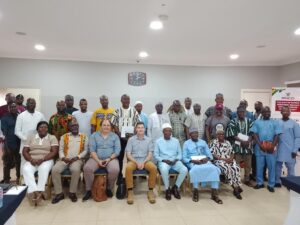By Samuel SAM
The World Bank has expressed strong satisfaction with the implementation of the Gulf of Guinea Northern Regions Social Cohesion (SOCO) project in Ghana, citing visible community impact, infrastructure development and broad-based engagement as evidence of success.
Gues-Robin Mearns, Director for Global Social Sustainability and Inclusion at the World Bank, commended the project’s progress during a working visit to selected beneficiary communities.
He noted that the project had exceeded expectations in supporting livelihoods, job creation and youth engagement—key components in addressing socio-economic drivers of instability.
“I am very satisfied. I have seen tangible, funded activities that have directly impacted communities. What is particularly impressive is the clear sense of community ownership—people see the project as their own, which is vital to its sustainability,” he remarked.
Mearns emphasised that witnessing the results on the ground had given him the confidence to advocate for additional financing to expand the project’s reach. “Having witnessed what the project is achieving first-hand strengthens the case for continued—and hopefully increased—support,” he added.
The SOCO project, launched as part of a regional response to growing insecurity across the northern Gulf of Guinea, aims to promote social cohesion and build resilience in border communities vulnerable to violent extremism, conflict spillovers from the Sahel and economic exclusion.
Since its inception, the project has covered 48 districts, reaching 217 clusters and 1,700 communities, with approximately 1.5 million individuals benefitting. To date, US$60million—representing 40 percent of Ghana’s US$150million allocation—has been disbursed in the first two years.
During the visit, Mearns and his delegation engaged with officials from the Ministry of Local Government, Metropolitan, Municipal and District Assemblies (MMDAs), and civil society organisations. The World Bank Director underscored the importance of community-led development, citing improvements in basic infrastructure such as schools, clinics and sanitation facilities.
Northern Regional Minister, Alhaji Shani Alhassan Shaibu, expressed gratitude to the World Bank for its vital role in Ghana’s development. “It is difficult to imagine what our communities would have been without this level of support. We are deeply grateful,” he said.

He added that the project had complemented the government’s local economic development initiatives and urged the MMDAs to ensure that the infrastructure was properly maintained for long-term benefit.
Samuel Seth Passah, Director for Local Governance and Decentralisation at the Ministry of Local Government, said the ministry has been actively monitoring the project to ensure value for money. He also voiced support for expanding the programme to all 16 remaining districts in northern Ghana.
Elizabeth Ohenewah Agyei, National Coordinator of the SOCO Project, noted the programme’s strategic focus on empowering youth and women. She highlighted the establishment of youth parliaments within communities as a platform for youth engagement in national discourse.
The World Bank’s endorsement and call for additional funding signal a strong vote of confidence in the project’s approach to strengthening local economies, promoting inclusion and enhancing stability in northern Ghana.










